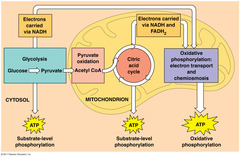| 5580006873 | glycolysis | the process of turning sugars into the 3-carbon molecule pyruvate |  | 0 |
| 5580013785 | ATP | adenosine triphosphate - the ideal molecule for energy storage; consists of ribose, adenine, and three phosphates | 1 | |
| 5580015875 | ADP | adenosine diphosphate; consists of ribose, adenine, and two phosphates | 2 | |
| 5580021331 | oxidation | the act of losing electrons | 3 | |
| 5580022869 | reduction | the act of gaining electrons | 4 | |
| 5580022870 | respiration | a process in living organisms involving the production of energy, typically with the intake of oxygen and the release of carbon dioxide from the oxidation of complex organic substances. |  | 5 |
| 5580033053 | aerobic respiration | respiration involving oxygen | 6 | |
| 5580033897 | anaerobic respiration | respiration lacking oxygen | 7 | |
| 5580160898 | obligate anaerobe | an organism that only uses fermentation; cannot survive in the presence of oxygen | 8 | |
| 5580125334 | facultative anaerobe | an organism that uses anerobic respiration when necessary | 9 | |
| 5580036178 | fermentation | the partial degradation of of sugars or other organic molecules without oxygen |  | 10 |
| 5580039174 | alcohol fermentation | fermentation resulting in alcoholic substances |  | 11 |
| 5580040969 | lactic acid | the end product of lactic acid fermentation | 12 | |
| 5580049957 | acetyl coenzyme A | the combination of coenzyme A and pyruvate that allows pyruvate to enter the citric acid cycle | 13 | |
| 5580057543 | Kreb's (citric acid) cycle | pyruvate molecules from glucose are further broken down into carbon dioxide; the nonpolar covalent bonds that are broken produce ATP; occurs in the mitochondria |  | 14 |
| 5580066963 | electron transport chain | electrons are carried to and from protein complexes; the electrons lose energy and the enrgy is used to pump H+ ions across the membrane to make a chemical gradient |  | 15 |
| 5580074667 | matrix | the part of a mitochondrion where organic molecules are oxidized | 16 | |
| 5580078475 | hydrogen acceptor | a molecule with a positive charge (an extra H+ ion) that accepts electrons, creating a molecule with a neutral charge (an extra H atom) | 17 | |
| 5580082760 | coenzyme | an organic molecule that helps an enzyme catalyze a reaction (nonproteins) | 18 | |
| 5580085162 | NAD+ | an electron carrier (coenzyme) | 19 | |
| 5580087320 | electrochemical gradient | a combination of chemical gradient (substances of different concentrations across a membrane) and an electrical gradient (different charges across a membrane); created with H+ in cellular respiration |  | 20 |
| 5580095742 | proton pump | a protein complex that uses energy from "falling" electrons in the ETC to pump H+ across a membrane | 21 | |
| 5580097373 | cristae | the partitions created by the folded inner membrane of a mitochondrion | 22 | |
| 5580104125 | chemical energy | the potential energy available for release in chemical reactions | 23 | |
| 5580107200 | dehydrogenase | an enzyme that removes H atoms in the ETC | 24 | |
| 5580114608 | chemiosmosis | the movement of ions across a semipermeable membrane down the electrochemical gradient | 25 | |
| 5580118024 | ATP synthase | the enzyme that phosphorylates ADP to create ATP using energy from H+ ions flowing down the gradient into the mitochondrion |  | 26 |
| 5580122101 | electronegativity | the affinity an atom has for electrons | 27 | |
| 5580129272 | deamination | the removal of an amino group from a compound | 28 | |
| 5580131493 | oxidizing agent | the molecule that gains electrons, oxidates other molecule | 29 | |
| 5580132473 | reducing agent | the molecule that loses electrons, reduces other molecule | 30 | |
| 5580137664 | proton-motive force | the H+ gradient that has the capacity to perform work | 31 | |
| 5580140795 | cytochrome | an electron carrier; consists of heme and other components | 32 | |
| 5580148012 | G3P | a 3-carbon intermediate between sugars and pyruvate | 33 | |
| 5580151413 | pyruvate | a 3-carbon molecule that is the first stable intermediate in cellular respiration | 34 |
AP Biology Chapter 7 Flashcards
Primary tabs
Need Help?
We hope your visit has been a productive one. If you're having any problems, or would like to give some feedback, we'd love to hear from you.
For general help, questions, and suggestions, try our dedicated support forums.
If you need to contact the Course-Notes.Org web experience team, please use our contact form.
Need Notes?
While we strive to provide the most comprehensive notes for as many high school textbooks as possible, there are certainly going to be some that we miss. Drop us a note and let us know which textbooks you need. Be sure to include which edition of the textbook you are using! If we see enough demand, we'll do whatever we can to get those notes up on the site for you!

